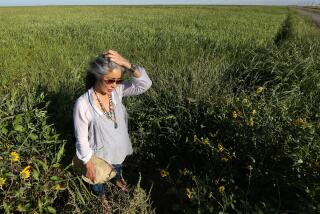California-Made Bento Headed for Japanese Market
- Share via
SACRAMENTO — It was proposed by an American diplomat in Tokyo. It was embraced by a risk-taking Japanese railroad executive. It was facilitated by a state trade official who knew an organic rice farmer in Chico.
As a result, beginning next year, 17 million passengers who ride the bullet trains and express commuter lines of Japan’s biggest railway will be offered traditional meals--the famous bento boxes--produced, cooked and packaged entirely in California.
The stakes for California products could be enormous: Bento is to Japan what hamburgers are to America, with more than 6 million such meals sold daily.
“This innovative concept will introduce a California-grown, -prepared and -packaged product to one of our most lucrative foreign markets,” California Trade Secretary Lon Hatamiya beamed at a gathering of Japanese railroad officials, Central Valley farmers and regional civic boosters last week in Sacramento.
The venture is not without risk. To get around Japan’s rigid rules restricting rice imports, the meals will be shipped frozen as “processed food.”
The company must convince Japanese consumers to buy a product that is cooked in a microwave and served hot. Normally, bento boxes--compartmentalized rice-based dishes served with meat, vegetables and condiments--are refrigerated and served at room temperature.
“This presents something of a cultural marketing challenge,” admitted Masaoki Takeda, chairman of NRE World Bento Inc., a subsidiary of the East Japan Railway Co.
But Takeda is hoping to benefit commercially from recent Japanese concerns about food purity, sparked by 1996 E. coli food poisonings in Osaka and recent scares over high dioxin levels in some Japanese-produced food.
“In Japan,” Takeda said, “the consumer is starting to put value on . . . quality.”
Terrence Barber, executive director of the U.S. Agricultural Trade Office in Japan, said he presented the idea of the California-produced bento at a Tokyo meeting with executives of NRE in early 1998. Later that year, he traveled with Takeda to the Natural Foods Exposition in Anaheim, where he introduced him to some of California’s leading organic farmers.
NRE studies concluded that it is cheaper to produce bento boxes in California and ship them 5,000 miles to Tokyo than it is to make them in Japan using local produce and labor.
The company, which controls food kiosks and restaurants at most major train stations in eastern Japan, hopes to begin daily shipments of 10,000 bento meals, which sell in Tokyo for about 550 yen--$5 at the current exchange rate--by next April.
Using his childhood contacts, California trade chief Hatamiya, a Harvard-educated Japanese American who grew up on a rice farm near Marysville, Calif., connected the railroad executives to Lundberg Family Farms, a 3,200-acre Chico rice grower that is the country’s largest producer of organic rice.
Chief Executive Grant Lundberg was so intrigued with the proposal that he joined the deal.
“We see it as a good opportunity to introduce Japanese consumers to organic and natural foods,” said Lundberg, whose family came to California from Nebraska in 1937 during the Dust Bowl.
The California bento will be marketed in the Japanese train stations and other outlets as “organic and pure” American food.
Jeffrey Schnack, a food consultant who has worked the past 10 years in Tokyo, will supervise the bento operation in Fairfield, an hour’s drive northeast of San Francisco.
“Right now I think Japan is about 10 years behind the United States regarding organic food,” Schnack said. “But there is a growing demand accelerated by the recent food scares. We hope to catch this wave.”
But Schnack said the ultimate success of the project depends on the quality of the rice. Japanese, as the world knows, are very particular about their rice.
“I’ve lived in Japan for 10 years and have been involved in the food industry the whole time,” Schnack said. “My wife is Japanese. But I don’t pretend to understand the intricacies and nuances of Japanese attitudes toward rice. It’s like talking to the Eskimos about snow.”
Lundberg said his farm will plant a Japanese rice varietal, Akita komachi, that is very close to traditional indigenous rice crops. The Fairfield plant will use the latest in cryogenic technology to quick-freeze the rice so there is little degradation.
“The benchmark is the white rice in the bento,” said Schnack. “If we don’t get the white rice right, there is no way we can sell it.”
More to Read
Inside the business of entertainment
The Wide Shot brings you news, analysis and insights on everything from streaming wars to production — and what it all means for the future.
You may occasionally receive promotional content from the Los Angeles Times.










